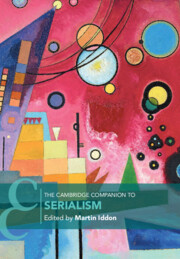Book contents
- The Cambridge Companion to Serialism
- Cambridge Companions to Music
- The Cambridge Companion to Serialism
- Copyright page
- Contents
- Figures
- Tables
- Contributors
- Preface
- Part I Contexts I
- Part II Composers
- 4 Arnold Schoenberg and the ‘Musical Idea’
- 5 Alban Berg’s Eclectic Serialism
- 6 Rethinking Late Webern
- 7 Milton Babbitt and ‘Total’ Serialism
- 8 Pierre Boulez and the Redefinition of Serialism
- 9 The Serial Music of Karlheinz Stockhausen
- 10 Luigi Nono and the Development of Serial Technique
- 11 Stravinsky’s Path to Serialism
- Part III Geographies
- Part IV Contexts II
- References
- Index
8 - Pierre Boulez and the Redefinition of Serialism
from Part II - Composers
Published online by Cambridge University Press: 07 March 2023
- The Cambridge Companion to Serialism
- Cambridge Companions to Music
- The Cambridge Companion to Serialism
- Copyright page
- Contents
- Figures
- Tables
- Contributors
- Preface
- Part I Contexts I
- Part II Composers
- 4 Arnold Schoenberg and the ‘Musical Idea’
- 5 Alban Berg’s Eclectic Serialism
- 6 Rethinking Late Webern
- 7 Milton Babbitt and ‘Total’ Serialism
- 8 Pierre Boulez and the Redefinition of Serialism
- 9 The Serial Music of Karlheinz Stockhausen
- 10 Luigi Nono and the Development of Serial Technique
- 11 Stravinsky’s Path to Serialism
- Part III Geographies
- Part IV Contexts II
- References
- Index
Summary
The decade of the 1950s witnessed a great transformation in the compositional practice of Pierre Boulez. The usual narratives of serialism during this decade have tended to dwell on Boulez’s experiments with multiple serialism in Structure Ia (1951), which were tremendously short lived. His desire to expand the serial principle, however, did not end with them. Ensuing works, like Le Marteau sans maître (1952–5), Pli selon pli (1957–62/89), and the Third Piano Sonata (1955–7/63), which brought Boulez to the pinnacle of his reputation within the European circle of composers, are those that truly redefined serialism. Through this redefinition, serialism remained an important element of Boulez’s compositional technique until the end of his career. This chapter shows that Boulez’s serialism was an essential forerunner of future trends, rather than a culmination of an abandoned practice, resulting in works and approaches that opened up new avenues for composition.
- Type
- Chapter
- Information
- The Cambridge Companion to Serialism , pp. 125 - 139Publisher: Cambridge University PressPrint publication year: 2023

